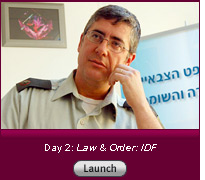A Terror Tour of Israel
For the average law-abiding American, knowledge of the criminal-justice system is largely formed by television. Unless you've got a law degree—or have been arrested—your knowledge of Miranda rights, body-cavity searches, and court procedures is usually drawn from episodes of The Wire or perhaps reading news of Paris Hilton's latest arrest. But as part of our counterterrorism tour, we were being given a step-by-step (or bus-stop-by-bus-stop) introduction to the Israeli military justice system.
Military courts were set up after the 1967 Six-Day War, when Israel took control of the West Bank, the Gaza Strip, the Sinai Peninsula, and the Golan Heights. The courts fall under the military commander for the region who makes the laws, appoints the judges, and sets up the judicial procedures.
The Ofer court, which has jurisdiction over a portion of the West Bank, is housed within a small trailer park on a dusty military base west of Ramallah. It's a simple setup: seven trailers, seven courts, with Trailer 3 reserved for appeals. There is no separate juvenile system; those under 18 are tried in the same courts as the adults. Our tour group was ushered inside one trailer, where a proceeding was about to get underway.
For the court workers, it must have been a strange sight: a group of American tourists crowded inside the peanut gallery, with Leitner providing a running translation of the court proceedings. "He's a famous Palestinian lawyer," he whispered, pointing to the robed defense attorney, who was running his hands over blue prayer beads as he exchanged small talk with the judges and the prosecutor. "He only represents terrorists."
One man's terrorist is another man's petty criminal. The first suspect, who entered with his legs shackled, was accused of smuggling weapons and drugs across the border from Jordan; a second defendant, brought in a few minutes later, was accused of keeping weapons without a permit. In fact, many of the cases brought before the court are not terrorism-related; petty crime and illegal border crossings (to find work in Israel) are two of the most common offenses. That said, terrorism-related offenses have also surged over the last seven years. Since 2000, Israel's total prison population has ballooned to 23,776 inmates, a growth of 248 percent.
In fact, most of what we were witnessing in court that day were discussions over scheduling (no small matter, since the dockets were booked up six months ahead). The proceedings had an improvised feel, an impression aided by the ramshackle trailer setting. On the Israeli side, everyone looked almost comically young: The prosecutor was wearing stylish glasses and tight pants, her dark, curly hair pulled back into a ponytail. The three judges lined up along the back could have passed for junior clerks in a U.S. court.
The approach to justice here is not quite Guantanamo Bay, but neither is it Law & Order. One thing, however, is similar to the television series: "Settle the case" is a common rejoinder in the military courts. "A tremendously high number of cases are plea-bargained," said Maj. Menachem Lieberman, a military judge at Ofer military base.
Israel's military-court system is attacked on many grounds, including the high rate of plea bargains (more than 95 percent) and low rate of acquittals (fewer than 1 percent). One of the most serious concerns is that many of the cases are built on confessions—later retracted in court—that are given to interrogators from Shabak (better known as Shin Bet), Israel's domestic-security agency.
Israeli military courts, like the U.S. military, are still wrestling with how to use information gleaned from interrogation. The courtrooms are to a certain extent open—the Israeli press and some members of the families of the accused often attend—but the prosecution can request that the courtroom be closed and that the transcript be sealed when a Shabak member testifies.
Lieberman, for his part, said he preferred to keep the doors open, allowing interrogators to testify behind a curtain. "The judge sees him, the defendant—who anyway knows what he looks like—gets to see him," he says. "But the people in the court itself, the bystanders, they won't see him, that's fine."
At another stop on the tour, we were introduced to Haim Ben Ami, a former head of interrogations at Shin Bet. He strolled across the stage like a movie director explaining a difficult scene to his audience.
"There's no way to convince a person in an interrogation to make a confession only with a polite way of talking," Ben Ami said with a wave of his hands. "It should be something that forces him to this corner. … He should suffer somehow."
The United States may now be grappling with questions of water-boarding and enhanced interrogations, but in Israel, these issues have been around for years. Torture is illegal in Israel, but also like in the United States, the difference between torture, enhanced interrogation, and run-of-the-mill interrogation is up for debate. As Ben Ami put it, "One box is torture? One smash is torture? Kick his balls once, it's torture? Twice, it's torture? Let's talk about it."
Ben Ami likes stories and has a flair for drama. Asked by a member of our tour what he would do if his own daughter's life were at stake, he tapped his prosthetic leg, noting that he had already been a victim of a terror attack (a grenade was thrown at him). But Ben Ami's best stories are about times when it might be useful to torture terrorists, like in the case of a pair of terrorists captured while crossing into Israel to set off a bomb in Tel Aviv. They were tortured during interrogation and gave up information on their comrades. Then what?
"So, I made a suggestion," Ben Ami said. "After the interrogation, we should bring these two guys back to the water, we put their head in water—bloop, bloop, bloop!—and let them float to Dead Sea. In the morning, two bodies in the Dead Sea, it happens."
Ben Ami's story, it turns out, was made up, a scenario meant to provoke discussion. Like a good TV show, it was often hard to tell where Ben Ami's stories crossed over into fiction. In his own version of a "ripped from the headlines" story, he recalled giving a lecture to law students at Harvard at the invitation of well-known professor Alan Dershowitz. He recounted to the students Shin Bet's involvement in delivering a suspected terrorist to the U.S. Embassy in Lebanon in 1983. The Israelis, Ben Ami said, had knowledge of a planned attack on the United States, but they knew no details. As Ben Ami recalled, the Israelis told the Americans: "Take him, make an interrogation, and we wish you success."
Except the suspect wouldn't talk. "He said: 'Look, I wish to talk, but I'm very tired. I'd like to fall asleep for at least two hours.' " The suspect was taken, at his request, to a nearby apartment to sleep. The next day, the embassy was destroyed.
The story is a powerful argument in favor of torture—or at least enhanced interrogations—except for one problem: Like Ben Ami's other story of the drowned terrorists (and most stories involving a "ticking time bomb"), it's apocryphal. It never happened. Real life is never that clean-cut. Ben Ami, however, forgot to reveal that to the Harvard law students.
Realizing his mistake later that day, Ben Ami panicked. "I called Alan Dershowitz and said, 'It's wrong.' " As Ben Ami recalled, Dershowitz told him not to worry: "He said, 'No, it's a good story, leave it.' "

